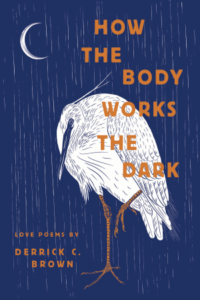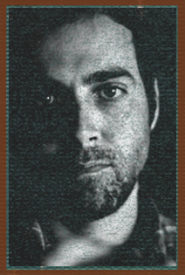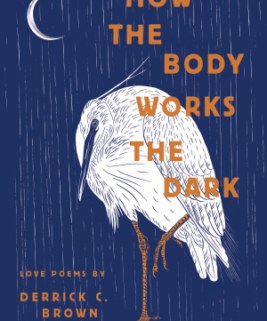Writers Read: How the Body Works the Dark by Derrick C. Brown
Dearest Soon,
I think I may be in love with you, Soon.
 The opening lines of Derrick C. Brown’s latest collection of love poems, How the Body Works the Dark, reveal the heart of his poetry in a sincere, simple declaration. Brown writes about love the way all poets should. His understated tone, diction, and sense of humor construct a modern collection of love poetry that feels sincere and fresh.
The opening lines of Derrick C. Brown’s latest collection of love poems, How the Body Works the Dark, reveal the heart of his poetry in a sincere, simple declaration. Brown writes about love the way all poets should. His understated tone, diction, and sense of humor construct a modern collection of love poetry that feels sincere and fresh.
Simple, declarative sentences like, “You kiss me like Hell is real” (“Mercy Sleeps”), and, “We kissed so hard / I could see how she was going to die” (“More”) are a mainstay of Brown’s voice. These electric one-liners are reminiscent of his earlier work. Brown’s the guy who said, “I am your blood,” and, “Stop ruining love by wanting it so badly” (“Kurosawa Champagne”). The latter line, made infamous by text graphics on Tumblr, has been shared so rampantly that “memes” sometimes fail to attribute the quote to him. To me, this is just one example of the demand for poets like Brown.
How I am nourished
by the night chaos
in your skin.
The service that overcomes me
when your legs ache. (“Soon”)
With frequent references to blood and body parts, there’s no question Brown is a poet of the body, a distinctly American characteristic he shares with poets like Whitman, Cummings, and Olds. Writing about the human body naturally raises questions of soul-body connection, individuality, and the human condition. For Brown, exploration of the physical body, its beauty and weakness, seems linked inextricably to its ability to influence relationships. “I ain’t trying to turn anyone on,” Brown quotes himself in the epigraph of his book, “I am trying to crack this fat skull and get her light out of my head.” The physical body is the centerpiece of the collection not to turn you on, but because it’s the vehicle to emotional intimacy.

Derrick C. Brown
The book is divided into two parts: “A Chosen Love” explores perceived intimacy when one falls in love, while “A Chosen Darkness” describes its unraveling and the conflict that ensues—unpredictable, sometimes ugly, and, God knows, realistic. Brown’s imagery summons forces of nature to represent both the ethereal and destructive parts of love. In “My Queen of Monster Lake,” he represents the speaker’s beloved as a dangerous force of nature—“Our love / is a lake full of lightning”—a conceit which is frequently referred to throughout the collection.
I want four days at Avila beach with you
until the breath-sucking sunset
is finally made common and we no longer
devour each others’ madness, we just lay around, staring. (“Mercy Sleeps”)
Though Brown’s work has been described as “true grit Americana,” with poems set against backdrops of rural Texas and Tennessee, the setting for the collection is clearly California, with references to Big Sur, the Felton Redwoods, and Santa Cruz Island.
The relatable and heartbreaking poem “Añejo” is set at a “Tequila bar on Sunset.” In this urban Los Angeles setting, nature is depicted as a (potentially fabricated) symbol for conflict, which presents itself at the moment of a breakup:
Outside it looked as if all the wind machines turned on
simultaneously, throughout Los Angeles back lots.
Brown, who is also a comedian, interjects his poetry with humor—probably because he can’t help it. In “Beyond Here,” he writes, “You are thinking of your last meal / and I am thinking of you covered in barbacoa.”
Brown’s sixth full-length book of poetry, How the Body Works the Dark presents a realistic, relatable portrait of love, its beauty and destruction.
Brown, Derrick C. How the Body Works the Dark. Not A Cult P, 2017.
—. “Kurosawa Champagne.” Scandalabra. Write Bloody Publishing, 2009.


 Jessica Abughattas has poems recently published in Thrush Poetry Journal, Stirring Lit, Heavy Feather Review, and elsewhere. She is an MFA candidate at Antioch University, associate managing editor of Lunch Ticket, and a reader at Frontier Poetry. Follow her on Twitter: @jessicamelia22
Jessica Abughattas has poems recently published in Thrush Poetry Journal, Stirring Lit, Heavy Feather Review, and elsewhere. She is an MFA candidate at Antioch University, associate managing editor of Lunch Ticket, and a reader at Frontier Poetry. Follow her on Twitter: @jessicamelia22


